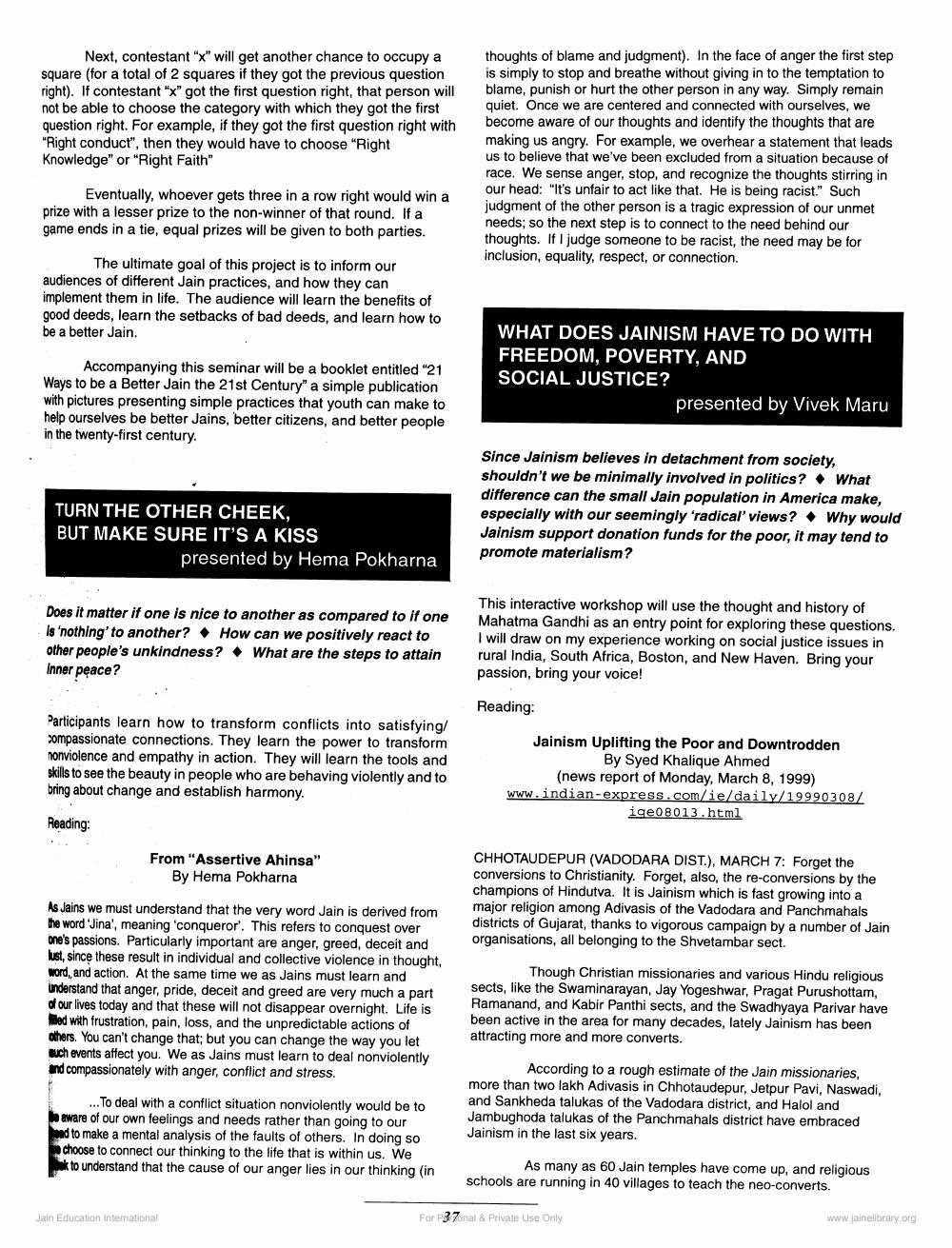________________
Next, contestant "x" will get another chance to occupy a square (for a total of 2 squares if they got the previous question right). If contestant "x" got the first question right, that person will not be able to choose the category with which they got the first question right. For example, if they got the first question right with "Right conduct", then they would have to choose "Right Knowledge" or "Right Faith"
thoughts of blame and judgment). In the face of anger the first step is simply to stop and breathe without giving in to the temptation to blame, punish or hurt the other person in any way. Simply remain quiet. Once we are centered and connected with ourselves, we become aware of our thoughts and identify the thoughts that are making us angry. For example, we overhear a statement that leads us to believe that we've been excluded from a situation because of race. We sense anger, stop, and recognize the thoughts stirring in our head: "It's unfair to act like that. He is being racist." Such judgment of the other person is a tragic expression of our unmet needs, so the next step is to connect to the need behind our thoughts. If I judge someone to be racist, the need may be for inclusion, equality, respect, or connection.
Eventually, whoever gets three in a row right would win a prize with a lesser prize to the non-winner of that round. If a game ends in a tie, equal prizes will be given to both parties.
The ultimate goal of this project is to inform our audiences of different Jain practices, and how they can implement them in life. The audience will learn the benefits of good deeds, learn the setbacks of bad deeds, and learn how to be a better Jain.
Accompanying this seminar will be a booklet entitled "21 Ways to be a Better Jain the 21st Century" a simple publication with pictures presenting simple practices that youth can make to help ourselves be better Jains, better citizens, and better people in the twenty-first century.
WHAT DOES JAINISM HAVE TO DO WITH FREEDOM, POVERTY, AND SOCIAL JUSTICE?
presented by Vivek Maru
TURN THE OTHER CHEEK, BUT MAKE SURE IT'S A KISS
presented by Hema Pokharna
Since Jainism believes in detachment from society, shouldn't we be minimally involved in politics? What difference can the small Jain population in America make, especially with our seemingly 'radical' views? Why would Jainism support donation funds for the poor, it may tend to promote materialism?
Does it matter if one is nice to another as compared to if one Is 'nothing' to another? How can we positively react to other people's unkindness? What are the steps to attain Inner peace?
This interactive workshop will use the thought and history of Mahatma Gandhi as an entry point for exploring these questions. I will draw on my experience working on social justice issues in rural India, South Africa, Boston, and New Haven. Bring your passion, bring your voice!
Reading:
Participants learn how to transform conflicts into satisfying compassionate connections. They learn the power to transform nonviolence and empathy in action. They will learn the tools and skills to see the beauty in people who are behaving violently and to bring about change and establish harmony.
Jainism Uplifting the Poor and Downtrodden
By Syed Khalique Ahmed (news report of Monday, March 8, 1999) www.indian-express.com/ie/daily/19990308/
ige08013.html
Reading:
From "Assertive Ahinsa"
By Hema Pokharna
CHHOTAUDEPUR (VADODARA DIST.), MARCH 7: Forget the conversions to Christianity. Forget, also, the re-conversions by the champions of Hindutva. It is Jainism which is fast growing into a major religion among Adivasis of the Vadodara and Panchmahals districts of Gujarat, thanks to vigorous campaign by a number of Jain organisations, all belonging to the Shvetambar sect.
As Jains we must understand that the very word Jain is derived from the word 'Jina', meaning 'conqueror. This refers to conquest over one's passions. Particularly important are anger, greed, deceit and ust, since these result in individual and collective violence in thought, word, and action. At the same time we as Jains must learn and understand that anger, pride, deceit and greed are very much a part of our lives today and that these will not disappear overnight. Life is led with frustration, pain, loss, and the unpredictable actions of others. You can't change that; but you can change the way you let such events affect you. We as Jains must learn to deal nonviolently and compassionately with anger, conflict and stress.
Though Christian missionaries and various Hindu religious sects, like the Swaminarayan, Jay Yogeshwar, Pragat Purushottam, Ramanand, and Kabir Panthi sects, and the Swadhyaya Parivar have been active in the area for many decades, lately Jainism has been attracting more and more converts.
...To deal with a conflict situation nonviolently would be to ho aware of our own feelings and needs rather than going to our nad to make a mental analysis of the faults of others. In doing so choose to connect our thinking to the life that is within us. We k to understand that the cause of our anger lies in our thinking in
According to a rough estimate of the Jain missionaries, more than two lakh Adivasis in Chhotaudepur, Jetpur Pavi, Naswadi, and Sankheda talukas of the Vadodara district, and Halol and Jambughoda talukas of the Panchmahals district have embraced Jainism in the last six years.
As many as 60 Jain temples have come up, and religious schools are running in 40 villages to teach the neo-converts.
Jain Education International
For P37nal & Private Use Only
www.jainelibrary.org




